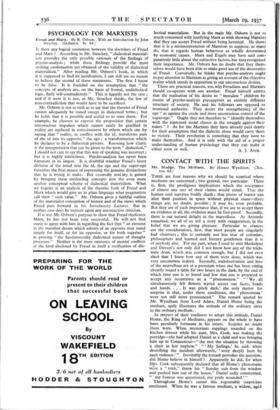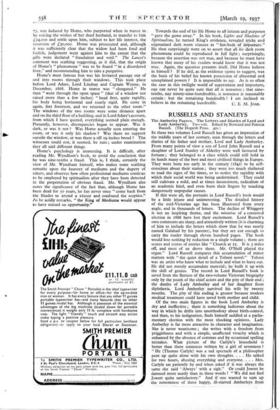CONTACT WITH THE SPIRITS
Mr. Sludge, The Medium. By Horace Wyndham. (iles. izs. 6d.) THERE are four reasons why we should be sceptical wh' ere medituns are concerned ; two general, two particular. There is, first, the prodigious implications which the acceptance of almost any one of their claims would entail. That the human soul survives bodily death ; that pieces of matter can alter their position in space without physical cause—thes ' things are, no doubt, possible ; it may be, even probable. But they are of such importance that, if we are to accept them on evidence at all, the evidence must be fool-proof. Secondly, there is our natural delight in the marvellous. As Aristotle "remarked, we all of us tell a story with exaggeration, in the belief that we are giving pleasure. Particular to seances are the considerations, first, that most people are singularly bad observers ; this is certainly not less true of scientists, philosophers and learned and literary gentlemen than it is of anybody else. For my part, when I used to visit Maskelirne and Devant's not only did I not know how any of the tricks were done, which was common enough, but I did not evcn think -that I knew how any of them were done, which was very uncommon indeed. Secondly, malobservation and love of the marvellous are at a premium when one has been sitting drearily round a table for two hours in- the dark, by the end of which time one is so bored and low that one is prepared to accept any occurrence as a "phenomenon." "'We all simultaneously felt flowers waved across our faces, heads and hands. . . . It was pitch dark,' the only matter for surprise is that, under these conditions, the 'phenomena' were not still more pronounced." The remark quoted by Mr. Wyndham from Lord Adare, Daniel Home being the medium, aptly illustrates the attitude of the ordinary sitter to the ordinary medium.
In respect of their readiness to adopt this attitude, Daniel Home,. the King of Mediums, appears on the whole to have been peculiarly fortunate in his sitters. Sceptics no doubt there were. When mysterious tappings sounded on the kitchen dresser while his aunt, Mrs. Cook, was making the porridge—she had' adopted Daniel as a child-and was bringing him up in Connecticut—" she met the situation by throwing a chair at her nephew." _" My. feelings,' , he said, when describing the incident afterwards, were" deeply hurt by such violence.' " Inevitably the remark provokes the question, did Home believe in himself? Apparently he did, for when Mrs. Cook subsequently declared that all Home's phenomena were a "trick," threw his "Sunday suit from the window and pushed him out of the house," Daniel sadly commented, "'my honour was questioned, my pride wounded.'"
Throughout Home's career this regrettable scepticism continued. When he was a famous medium, a widow, aged
75, was induced by Home, who purported when in trance to , be voicing the wishes of her dead husband, to transfer to him £24,000 and settle upon him, subject to her life interest, the reversion of k3o,0o0. Home was prosecuted and, although
it was sufficiently clear that the widow had been fond and foolish, judgement went against him to the extent that the gifts were declared "fraudulent and void.", The Lancet's comment was scathing suggesting, as it did, that the origin of Home's " phenomena " was to be found" in a disordered liver," and recommending him to take a purgative.
Home's most famous feat was his levitated passage out of and into rooms through their windows. This took place before Lord Adare, Lord Lindsay and Captain Wynne, in December, 1868. Home in trance was "elongated." He then "went through the open space" (that of a window not raised more than a few inches) "head first, quite rapidly, his body being horizontal and nearly rigid. He came in again, feet foremost, and we returned to the other room."
The windows of the two rooms were some distance apart and on the third floor of a building, and in Lord Adare's account, from which I have quoted, everything seemed plain enough.
Presently, however, discrepancies began to appear. Was it dark, or was it not ? Was Home actually seen entering the room, or was it only his shadow ? Was there no support outside the window, or was there a sill 19 inches broad ? The witnesses could not, it seemed, be sure ; under examination they all said different things.
Home's psychology is interesting. It is difficult, after reading Mr. Wyndham's book, to avoid the conclusion that he was nine-tenths a fraud. This is, I think, certainly the view of Mr. Wyndham himself, who makes some scathing remarks upon the knavery of mediums and the dupery of sitters, and observes how often professional mediums continue to be employed by spiritualists after they have been detected in the perpetration of obvious fraud. Mr. Wyndham also notes the significance of the fact that, although Home has been dead for so years, he has never once "come back from the Shades to attend a seance and confound the sceptics." As he acidly remarks, "the King of Mediums would appear to have missed an opportunity."
Towards the-end of his life Home to all intents -and purpotes "gave the game away." In his book, Lights and Shadows of Spiritualism, he turned King's evidence, revealed tricks and stigmatised dark. room seances as "hot-beds of imposture." He then surprisingly went on to assert that all his dark room phenomena could be reproduced in full light ; surprisingly, because the assertion was not true, and because he must have known that many of his readers would know that it was not true. Again, the question presents itielf, Did Home believe in himself? If he did,,as the evidence seems to suggest, was the basis of his belief his known possession Of abnonnal and unexplained powers ? It is impossible to say. As is so often the case in this twilight world of superstition and imposture, orle can never be quite sure that all is nonsense ; that nine- tenths, nay ninety-nine-hundredths, is nonsense is reasonably certain : but the remaining hundredth ? I am inclined to





































































 Previous page
Previous page